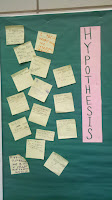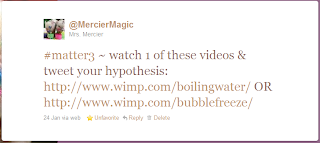Hypothesizing
A great conversation today! We recently received two additional Nooks in our classroom to give us 4. The children were absolutely mad about the original two we had, so imagine their excitement when we received two more. We started to talk, & began to wonder: does technology really help you learn? Their thinking was pretty amazing (& allowed me to see what they've internalized). Most of them immediately said yes because of the following:
From their conversation, they developed a hypothesis of whether e-readers make you better readers / thinkers. (They insisted on the word thinkers because sudoku & chess are on Nooks & those are strategy games, & strategy games create thinking.) And then, I challenged them. PROVE IT! They decided they would create bar graphs to keep track of the amount of time they spend on the Nooks. They would delineate between time spent reading & time spent playing strategy games. We would then combine individual data to create group data, monitoring our progress once a week.
Ahh...but how will you measure whether or not you are really learning more? I prodded. They decided that they would use their Just Right Book Levels, and any tests that we do. We agreed that we would use DRA scores & other reading tests done in January to make a determination. Interestingly, they said, well we're not going to be using the Nooks all of the time because we have to share them with each other & we'll be reading regular books. Doesn't reading create better readers? Excellent point (& variable), & one we'll have to come back to in January when we are analyzing our data.
- meets your learning style ~ listen, watch, read, do
- you can research
- learn from others
- create new ideas
- inform
- it gives you quick access
- helps you focus because your experience is personalized
- you can connect with others
- there's process in different things you do
- safety
From their conversation, they developed a hypothesis of whether e-readers make you better readers / thinkers. (They insisted on the word thinkers because sudoku & chess are on Nooks & those are strategy games, & strategy games create thinking.) And then, I challenged them. PROVE IT! They decided they would create bar graphs to keep track of the amount of time they spend on the Nooks. They would delineate between time spent reading & time spent playing strategy games. We would then combine individual data to create group data, monitoring our progress once a week.
Ahh...but how will you measure whether or not you are really learning more? I prodded. They decided that they would use their Just Right Book Levels, and any tests that we do. We agreed that we would use DRA scores & other reading tests done in January to make a determination. Interestingly, they said, well we're not going to be using the Nooks all of the time because we have to share them with each other & we'll be reading regular books. Doesn't reading create better readers? Excellent point (& variable), & one we'll have to come back to in January when we are analyzing our data.


I agree with your kiddos, just spending time reading results in better readers. Sometimes the hardest thing is just getting them interested in reading. It would be interesting to see if they spend more time reading as a result of using their Nooks, can't wait to see the data!
ReplyDelete